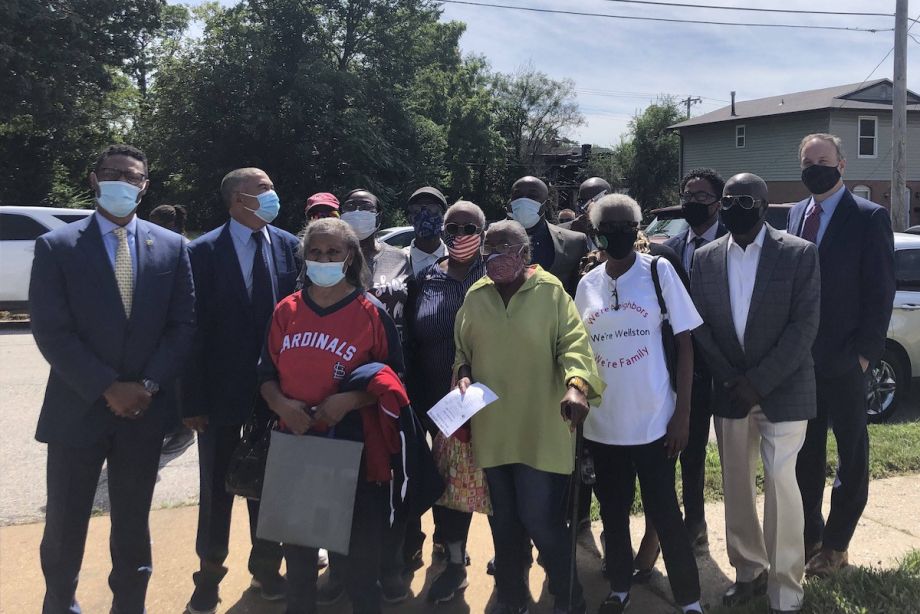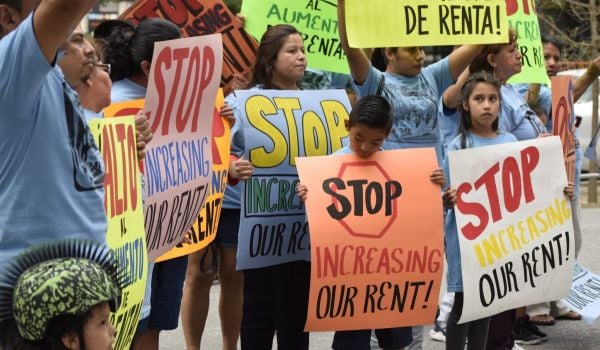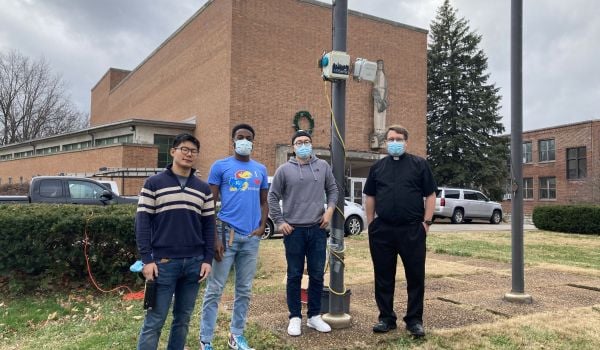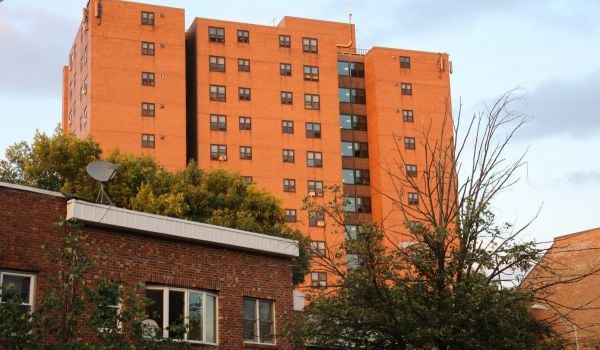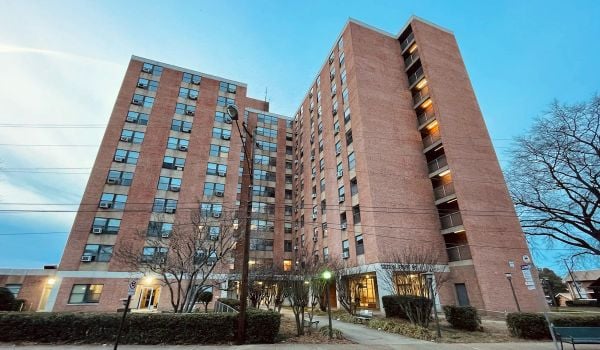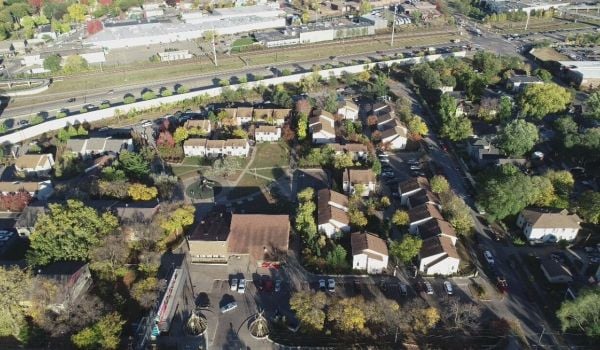In the coming weeks, families will start to move back into rehabilitated public housing in Wellston, Missouri. For Mayor Nathaniel Griffin, their return offers both relief that a stressful phase that affected a quarter of the town’s residents is concluding and motivation to continue addressing the challenges Wellston still faces. “Until they left, I never knew there were so many HUD homes in our community,” Griffin says. “Our streets were just empty.”
After HUD advocated demolishing 201 public housing units in the small St. Louis suburb, unlikely collaborators spearheaded a yearslong effort to voluntarily convert them to private ownership instead. The result: A $44.5 million community reinvestment project that saved 186 of the homes. Griffin and other community leaders believe that although it was unique in many ways, the framework can ultimately be replicated in other struggling public housing projects. “We have a blueprint for how to change high-poverty communities from the ground up,” he says.
The Wellington Family Homes project includes 186 units on 65 separate parcels scattered throughout Wellston, totaling roughly a fifth of the town’s residences. The extensive renovations cover everything from new roofs and windows to cabinets, lighting, bathrooms, paint, flooring, and sidewalks. Work is expected to be completed by 2025.
Griffin, who once lived in public housing himself, recognizes why tenants had become accustomed to the units’ poorly maintained, deteriorating state over the years. Heating and air conditioning went out for months at a time after parts were stolen from the units; broken doors and windows weren’t repaired; routine maintenance was deferred for years. “When you live in these types of communities, you never know how you should be treated in quality housing,” he says.
Tenants also dealt with decades of ineffective and sometimes corrupt management by the Wellston Housing Authority. The problems ultimately led to HUD’s 2018 decision to close down the federally controlled authority — and to demolish the housing rather than returning it to local control, as it had previously done under similar circumstances in other cities. Wellston City Council approved the plan.
For Griffin, who had worked hard since being elected in 2014 to stabilize the formerly vibrant suburb after a decades-long decline, the situation felt crushing. He initially supported HUD’s plan too, but after it passed the council he realized how devastating the loss of population would be after the units were demolished and the city was left with property it couldn’t afford to redevelop. And after learning more about the condition of the homes, he came to believe most of them could be renovated.
“I was excited about getting the empty land, but then I realized I fell for fool’s gold. My chain was gonna turn silver and my neck was gonna turn green,” he says. “That’s when reality set in that I had to fight for this city.”
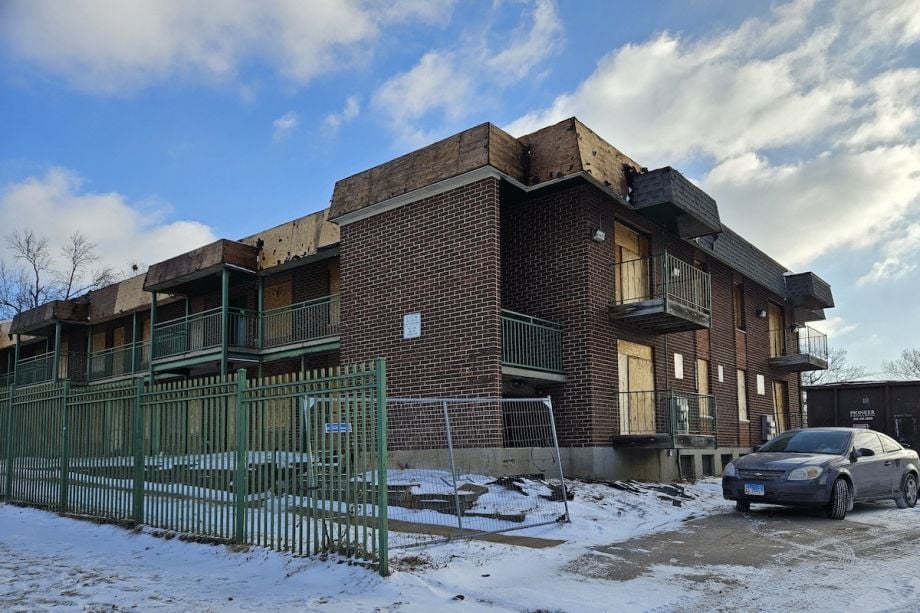
These homes are part of the Wellington Family Homes development's Halter Heights concept. (Photo by Amy De La Hunt)
After HUD announced the decision, a group of residents reached out to a trusted community anchor, the St. Augustine Wellston Center, to assist them in finding who might be able to help save their homes. “We were going to all the meetings [with HUD], thinking that they were gonna help us out financially and fix up some of the complexes out here in Wellston,” resident Flora Mix said in a 2020 interview. “Then all of a sudden we heard they were gonna close them down and everybody had to move. And I was like, ‘Wait a minute, that’s not right… There should be something I can do.’”
At the behest of some of the center’s board members, Legal Services of Eastern Missouri assigned one of its newest attorneys, Lisa D’Souza, to accompany the head of its housing program to a town hall where community members were seeking more information about the impending demolition. Residents were unclear on what was happening and why. Many had signed paperwork effectively agreeing to be evicted without realizing what they had signed. The meeting was packed with many of the 500 public housing residents — who made up a quarter of Wellston’s population — as well as neighbors, local business owners and elected officials.
Legal Services of Eastern Missouri eventually signed on to represent the Wellston Tenant Association, an advocacy group formed in 2018 that granted automatic membership to all public housing residents in the city. D’Souza set about gathering information from HUD about the condition of the housing. She also formally asked HUD to halt its demolition plans and find an alternative solution.
Meanwhile, residents were also reaching out to Shannon Koenig, who worked for St. Louis County Executive Steve Stenger. Koenig was a familiar face in Wellston thanks to her previous work in the county’s Office of Community Development administering HUD grants. She served as a point of contact between Stenger’s administration, the county’s housing authority and Wellston officials.
In 2018, St. Louis was still grappling with how to respond to Michael Brown’s 2014 death in Ferguson. Racial tension was high. Various reports had highlighted the stark differences between impoverished, majority-Black neighborhoods like Wellston and wealthy suburbs in adjacent ZIP codes.
These disparities weighed on Koenig. She was very aware of the “destruction of Black communities in St. Louis, and I was hearing from Mayor Griffin that demolishing the public housing was going to obliterate his city,” she says.
“I felt that they deserved to be heard and listened to — and to have an institution like county government act on their behalf for something they said they wanted, as opposed to government imposing their will on the housing authority and the city of Wellston.”
A series of fortunate events
D’Souza describes what happened next as a series of “fortunate happenstances.”
First, the longest-ever federal shutdown happened between December 2018 and January 2019. HUD couldn’t take any action — even communications were frozen — which gave the tenants time to organize.
Serendipitously, in preparation for a previous initiative that would have turned over the housing authority to local control, HUD had been training prospective new members for a tenant-led board. “The Wellston community had been learning what subsidized housing was and what it meant to have local control, which connected them around this topic,” D’Souza says.
In March, HUD transferred the units to the Housing Authority of St. Louis County, which voted two months later to approve the “demolition and disposition” plan. The prevailing opinion was that the renovations would be too costly — and, as D’Souza explains, the high price tag for repairs wasn’t HUD’s fault. “Congress had just not allocated money for subsidized housing commensurate with the need for the housing to be preserved.”
However, that’s when the second “fortunate happenstance” occurred. In May, Stenger, the St. Louis County executive, who also favored demolition, had to step down and was eventually convicted of corruption for pay-to-play schemes — including the sale of land in Wellston at less than market value to a campaign donor.
“The new county executive, Dr. Sam Page, was intent on showing he was unlike his predecessor and unlike the national administration,” D’Souza says. Moreover, he held a belief that “blighted neighborhoods became that way because of choices we made, not because of anything the people in those neighborhoods did or didn’t do.”
At the national level, HUD Secretary Ben Carson had publicly testified before a House committee that his agency wanted to help Wellston residents. Former U.S. Rep. Lacy Clay, whose Congressional district included Wellston, brokered a meeting where Carson and other HUD officials spoke with Griffin.
Griffin came away from what he recalls as a tension-filled conversation with an olive branch: 120 days to develop a plan to save the public housing units.
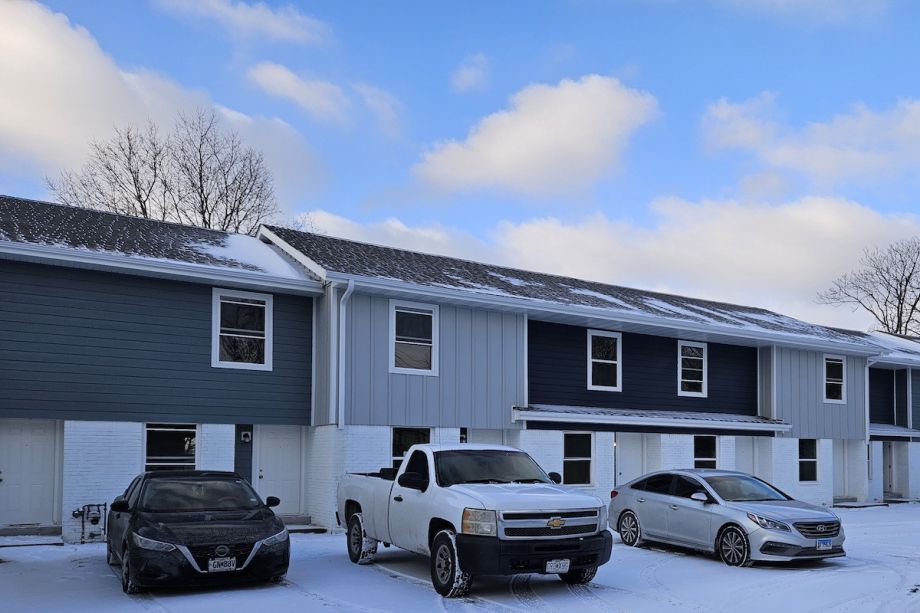
These row houses are part of the Wellington Family Homes development's Electric City Concept. (Photo by Amy De La Hunt)
Griffin, D’Souza and Koenig became key figures in a flurry of meetings with a core group of elected officials, affordable housing experts, and other stakeholders. They all described the meetings as historic due to the sense of unity toward a single common goal to do what was best for the residents of Wellston — and for a stated commitment to transparency, accountability, and responsibility in a municipality where corruption had been an ongoing challenge.
The hard work paid off. The group came up with a direction, laid out the details of financing and presented the plan, which HUD approved. To avoid any trace of the financial improprieties that plagued Wellston for decades, they chose a Louisiana-based developer, Knight Development, which had no local connections and was experienced in renovating scattered-site public housing.
An unusual voluntary conversion deal
The end result was a 4% Low-Income Housing Tax Credit project made possible through HUD’s Voluntary Conversion Program. “Voluntary conversion is not an often-used tool, but it is one way that public housing can be converted into privately owned affordable housing,” D’Souza explains. Fifteen of the units were determined to be structurally unsound and had to be demolished, but the remaining 186 were slated for thorough renovations.
When the complex deal finally closed in March 2023 — after years of delays due to the COVID pandemic, rising costs and other factors — the project was valued at $44,505,228.
Wellston Community Empowerment Corp., a nonprofit, was established in 2021 for the purpose of retaining local control over the development long term. The Housing Authority of St. Louis County, which owned and operated the public housing units for the families who remained, transferred the land to the WCEC before closing the tax credit deal. The housing authority retained a minute ownership stake, and assisted the developer and WCEC with transitioning the housing and getting to closing. Knight, the developer, is splitting a portion of its development fee with WCEC, and it will pay $4.6 million to the nonprofit over the coming years under a seller financing agreement.
Knight Development and the WCEC are the managing general partners; Knight oversees the day-to-day operations and shares construction oversight responsibilities with WCEC, while the tax credit syndicator CREA owns most of the development as a limited partner, a role typically played by passive investors. (Learn more about LIHTC ownership structures.)
The housing authority has committed 186 project-based vouchers to Wellington Family Homes, which means that for the next 20 years — and beyond if the contract is renewed — residents of the development will pay no more than 30 percent of their income on rent, and it will stay affordable to those with very low incomes. The project-based vouchers are funded through HUD. Residents who previously lived in the homes and meet income guidelines — like Mix and her fellow Wellston Tenant Association board members — will be given priority to move back in once renovations are complete. When construction began in 2023, fewer than two dozen households remained in the units; the rest had received tenant vouchers from the Housing Authority of St. Louis County that could be used on the private rental market until the situation in Wellington was resolved. After previous tenants who want to return have been accommodated, the remaining units will be opened up for other income-qualifying applicants.
D’Souza says the project-based vouchers, along with tax credits for the developer, made the financing possible. After 15 years, when the tax credit compliance period ends, the WCEC has the option to take full ownership of the housing. Griffin, who chairs its board, says the proceeds from the developer fee and the seller financing agreement with Knight Development, as well as any other income the nonprofit earns in the meantime, will be saved to ensure the nonprofit has the capacity to acquire and manage the housing down the road.
Mix’s family was among a wave who moved to Wellston during its heyday in 1968, and she returned to her childhood community in 2020, intending to peacefully retire. But the horrible conditions in the units prompted her to take a leadership role. “When we started this journey, we didn’t know how it was going to turn out, but we were determined,” Mix says. “It makes my heart proud to know I played a part in it.” She describes the deal as unbelievably positive for the community.
“We are pleased to see housing conditions improving for Wellston residents after a long history of struggle,” said HUD Principal Deputy Assistant Secretary for Public and Indian Housing Richard J. Monocchio. “Not only does it remedy issues from the past but allows residents and the community to look to the future with quality housing.”
Remarkably, throughout the entire process, the people and organizations involved in negotiations on the initial agreement remained engaged. In particular, Griffin credits Koenig and D’Souza with providing pivotal support. “We did some laughing and crying,” he recalls. Importantly, the three were able to share their perspectives and learn together even while under tremendous pressure. “We were able to walk each other’s journey by listening to each other.”
Koenig, who has headed the Housing Authority of St. Louis County since 2021, agrees. “It took blood, sweat and tears to get [to closing],” she says. “It’s wonderful to change the course of history, and I hope it continues on this trajectory for Wellston.” The community has already received several million dollars of investment in complementary development, economic, and blight removal activities to support the long-term success of this revitalization effort.
In October 2023, HUD officials visited Wellston to tour construction progress, meet key stakeholders and talk about future initiatives. The tone was so convivial that several officials, including Monocchio, ended up shooting hoops together with the mayor’s 4-year-old grandson.
“They saw that we have a village here to build something special,” Griffin says.
This story was co-published in collaboration with Shelterforce, the only independent, non-academic publication covering the worlds of affordable housing, community development and housing justice.
This article is part of Backyard, a newsletter exploring scalable solutions to make housing fairer, more affordable and more environmentally sustainable. Subscribe to our weekly Backyard newsletter.
Amy De La Hunt is a St. Louis-based writer and editor who covers community development, education, immigration and all things culinary for a wide range of publications. She shares snippets from her editorial life at @amy_in_words.



